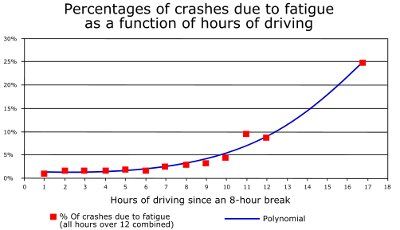Review Questions - Click On The Picture To Begin...

- To keep drivers from sitting too long between load assignments
- To reduce accidents caused by driver fatigue
- All of these answers are true
- To ensure drivers are being paid at least minimum wage
Quote From The CDL Manual:
Why Do HOS Regulations Exist?
The purpose of HOS regulations is to reduce accidents caused by driver fatigue. Many drivers don't like being told when they can and can't drive, but as you can see in Figure 13-1 below, the risk of an accident is directly related to how many hours a driver has been behind the wheel. HOS regulations were designed so that drivers wouldn't push themselves too far and also so that carriers can't force drivers to drive beyond their limits.
Figure 13-1

- To ensure drivers wouldn't push themselves too far
- So that carriers can't force drivers to drive beyond their limits
- To regulate the maximum amount of time drivers can spend resting between driving shifts
- To require drivers to keep an updated log showing all of their working and resting hours
Quote From The CDL Manual:
What Are Hours Of Service Regulations?
HOS regulations are rules issued by the Federal Motor Carrier Safety Administration (FMCSA) which is a division within the Department of Transportation (DOT). The regulations limit the number of daily and weekly hours which can be spent driving and working. They also regulate the minimum amount of time drivers must spend resting between driving shifts. Drivers are required to keep an updated log showing all of their working and resting hours.
Why Do HOS Regulations Exist?
The purpose of HOS regulations is to reduce accidents caused by driver fatigue. Many drivers don't like being told when they can and can't drive, but as you can see in Figure 13-1 below, the risk of an accident is directly related to how many hours a driver has been behind the wheel. HOS regulations were designed so that drivers wouldn't push themselves too far and also so that carriers can't force drivers to drive beyond their limits.
Figure 13-1

TruckingTruth's Advice:
The required resting periods are minimum requirements, not maximum requirements. The same can be said about working hours. Bottom line, if you're too tired to drive, don't drive!
- Police Officers
- Carriers
- All of these answers are correct
- DOT Officials
Quote From The CDL Manual:
Who Enforces HOS Regulations?
Law enforcement:
Generally, DOT officers are the ones who enforce HOS rules, although any police officer may inspect a driver's logbook. Individual states are responsible for maintaining weigh stations where drivers are pulled in for random vehicle and logbook inspections. Drivers may also be pulled over for random checks by police officers or DOT officials at any time and have their logbooks inspected. While it's not a frequent occurrence, chances are your logbook will be checked every now and then. Be ready for it at all times!
Carriers:
In addition to law enforcement and DOT officials, most carriers have their own company policies regarding logbooks. A drivers logs are frequently reviewed by internal auditors for discrepancies or violations. A driver with too many violations might be warned, disciplined, or terminated (terminating a driver usually only occurs after several violations). The increased use of electronic logging devices has forced carriers to crack down on HOS violations even more.
TruckingTruth's Advice:
You should always be prepared for a random inspection. Your logs must always be current. If you get pulled into a weigh station or get pulled over for a random inspection, which does happen, and your logbook is not current, you will be cited for a violation.
The carrier you work for will also have logbook auditors. Companies themselves are required to keep driver logs for a period of time and receive random audits from the DOT. If too many of their drivers have logbook violations, the company can be fined or otherwise penalized. They have an interest in passing those audits so if you cause too many problems for them, they will take action.
- Your logbook can be checked by your carrier at anytime
- The increased use of electronic logging devices has forced carriers to crack down on HOS violations
- Your logbook can be randomly checked anytime you go through a weigh station
- Non-DOT law enforcement officers need probable cause to inspect your logbook
Quote From The CDL Manual:
Who Enforces HOS Regulations?
Law enforcement:
Generally, DOT officers are the ones who enforce HOS rules, although any police officer may inspect a driver's logbook. Individual states are responsible for maintaining weigh stations where drivers are pulled in for random vehicle and logbook inspections. Drivers may also be pulled over for random checks by police officers or DOT officials at any time and have their logbooks inspected. While it's not a frequent occurrence, chances are your logbook will be checked every now and then. Be ready for it at all times!
Carriers:
In addition to law enforcement and DOT officials, most carriers have their own company policies regarding logbooks. A drivers logs are frequently reviewed by internal auditors for discrepancies or violations. A driver with too many violations might be warned, disciplined, or terminated (terminating a driver usually only occurs after several violations). The increased use of electronic logging devices (discussed later) has forced carriers to crack down on HOS violations even more.
TruckingTruth's Advice:
Your logbook could be checked at anytime for any reason. Make sure it is always updated!
- Department of Transportation
- Days of On-Duty Time
- Diary of Time
- Department of Timekeeping
Quote From The CDL Manual:
As a truck or bus driver, you'll be required to record and abide by all working and driving limitations which were created by the Department of Transportation (DOT). The rules govern a commercial driver's working and resting hours and are referred to as Hours of Service (HOS) Regulations. In this section we will guide you through the HOS regulations and teach you the best methods of properly recording your hours.
TruckingTruth's Advice:
Everyone in trucking refers to the Department of Transportation as "The DOT." If you don't know this, you'll sound like a rookie. You don't want that, do ya!?
- During a random traffic stop by any police officer
- All of these answers are correct
- Your carrier can audit your logbook anytime
- At any weigh station your logbook can be checked for any reason
Quote From The CDL Manual:
Who Enforces HOS Regulations?
Law enforcement:
Generally, DOT officers are the ones who enforce HOS rules, although any police officer may inspect a driver's logbook. Individual states are responsible for maintaining weigh stations where drivers are pulled in for random vehicle and logbook inspections. Drivers may also be pulled over for random checks by police officers or DOT officials at any time and have their logbooks inspected. While it's not a frequent occurrence, chances are your logbook will be checked every now and then. Be ready for it at all times!
Carriers:
In addition to law enforcement and DOT officials, most carriers have their own company policies regarding logbooks. Not only do carriers want to ensure their drivers are being safe on the roadways, but carriers often receive audits from DOT officials and can be heavily fined if too many drivers have violations on their logs. A drivers logs are frequently reviewed by internal auditors for discrepancies or violations. A driver with too many violations might be warned, disciplined, or terminated (terminating a driver usually only occurs after several violations). The increased use of electronic logging devices (discussed later) has forced carriers to crack down on HOS violations even more.
TruckingTruth's Advice:
Your logbook can be checked virtually anytime. Never press your luck. Make sure your logbook is legal and up to date all the time.
- Hours on Site
- Highway Organization System
- Hometime Optimization System
- Hours of Service
Quote From The CDL Manual:
As a truck or bus driver, you'll be required to record and abide by all working and driving limitations which were created by the Department of Transportation (DOT). The rules govern a commercial driver's working and resting hours and are referred to as Hours of Service (HOS) Regulations.
TruckingTruth's Advice:
During the rest of this program, we will be referencing HOS instead of saying Hours of Service every time. As an industry standard, HOS always stands for Hours of Service and the vast majority of people in the trucking industry are very familiar with the term HOS.








 TT On Facebook
TT On Facebook